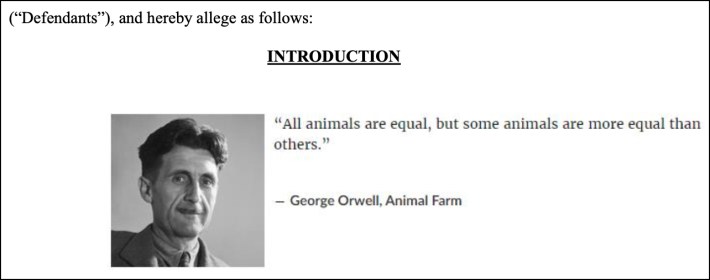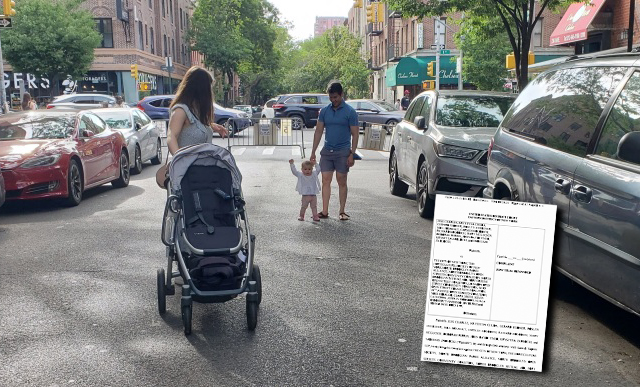Advocates and lawyers blasted a federal lawsuit aiming to end New York City's open streets program by accusing the three-year-old initiative that reclaimed space from cars of violating the rights of people with disabilities.
The case filed in Brooklyn federal court Monday is on behalf of 12 people with disabilities who live on or near an open street and who say they rely on cars to get around. The plaintiffs allege the restrictions on traffic violate their federal rights to the public street under the Americans with Disabilities Act, the Rehabilitation Act, along with state and city human rights law.
The 47-page filing is a mix of legal arguments and bizarre assertions — it opens off with a quote from George Orwell's "Animal Farm" and later accuses street safety advocates of being Nazi "brown shirts," and compares the very name of the program ("open streets") to the propaganda language "newspeak" from Orwell's other novel, "1984."

The legal challenge is unlikely to succeed because it relies on anecdotes rather than proving systemic issues with the program, one attorney said, and the complaints ignore the endless ways in which cars have long blocked access all over the city — including access to the disabled.
"The plaintiffs in this suit can now cross the [open] street without getting run over by a car and without having to go to a corner to do so," said Steve Vaccaro of Vaccaro and White. "Whenever there’s a street closure they’re similarly burdened by allowing free parking in front of their residences at the curbside that limit their access to reach taxicabs or ADA transit providers."
Advocates took to social media to denounce the case, saying open streets provided more access to public space that has long been gobbled up by cars.
The son of a disabled parent, I'm angered by the accessibility complaints to Open Streets. The built world disabled my mom: double-parked cars; blocked crosswalks; restaurants w/o ramps. It's shit she isn't alive to see @31stAveOS—a rare public place we could've enjoyed together.
— John Surico (@JohnSurico) April 26, 2023
A lawyer for the plaintiffs in the New York case accused the city of ignoring requests to make the program accessible, and said it should have staff to move the barriers, similar to school crossing guards. The DOT has not provided staff to do that — something both opponents and supporters of open streets agree would be helpful.
"There’s a way to make the open streets work for everyone, but we’re not there, and they’ve completely ignored the disabled community in trying to just ram through what their vision is," said plaintiffs's lawyer Matthew Berman, an attorney with Long Island firm Valli Kane and Vagnini LLP.
Berman said the labelling of street safety advocates as Nazi partisans was "figurative, not literal," but then said they were enabling "authoritarianism."
The lawsuit against the city and several groups managing major opens streets in Manhattan, Queens, and Brooklyn claims the initiative impedes emergency service access and the plaintiffs's ability to drive to their residence or get transportation like Uber and Lyft or Access-A-Ride, and that the barriers are challenging for some people to move.
The filing also has pictures of delivery trucks illegally parked perpendicularly along the edge of open streets, along with grainy shots of a fire truck and an ambulance, but it is not clear from the latter pictures whether the emergency vehicles are actually blocked from entering. The FDNY and DOT have long stated that the open streets barriers are not an impediment to emergency response.
The Department of Transportation's program rules allow local access only or “full closures,” which still require a 15-foot emergency lane remain clear at all times.
Volunteers are tasked with moving the barriers, and one disability rights advocate said the metal barricades can pose challenges, but added the city should work on addressing those specific issues rather than throwing out the baby with the bathwater.
"Having streets closed [to cars] can benefit disabled people just like they can benefit anybody," said Joe Rappaport, executive director at the Brooklyn Center for Independence of the Disabled. "If there are problems with the program, the DOT has to work to correct them."
DOT has started turning pandemic-era open streets into permanent redesigns like shared streets, which calm traffic with bulb outs and no longer rely on barriers and volunteers to move them.
Vaccaro said federal law was not designed to give people vehicle access around the clock, and he said the case should be dismissed.
"The ADA was not made to enable a group of disabled people on a block to prevent any restriction on 24/7 unfettered motor vehicle access," the attorney said. "Their fix, which would be to eliminate the open streets program apparently, would be to destroy a program that meets important and undeniable public health needs, including disabled people who have difficulty crossing the street."
Free curbside parking or cops blocking the sidewalk outside precinct station houses are true systemic issues blocking access every day, the lawyer added.
Vaccaro also said that the plaintiffs in this case would have demanded a temporary restraining order — common in such cases — if the open streets program was truly causing immediate harm.
"These are overblown claims, and there is no TRO proposed because even the plaintiffs realize they can’t with a straight face claim irreparable harm, as much as they try to make it look like that and how the complaint is written," said Vaccaro.
A similar 2021 lawsuit in California to end car-free "slow streets" through San Francisco's Golden Gate Park was unsuccessful; a judge in the Golden State said the restrictions barred vehicles, not people, and sided with the city that the program had immense public benefit, according to news reports and court filings.
DOT spokesman Scott Gastel declined to comment on the case's specifics, but strongly defended the program's benefits.
"Open Streets enhances safety, accessibility, and equity for a large number of New Yorkers using the roads, including seniors and people with disabilities," said Gastel.






